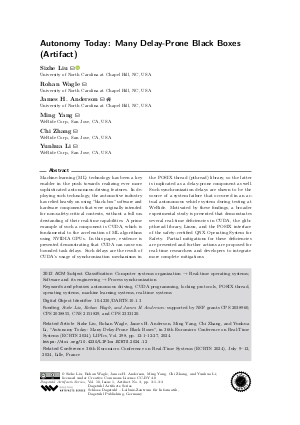Autonomy Today: Many Delay-Prone Black Boxes (Artifact)
Authors
Sizhe Liu  ,
Rohan Wagle,
James H. Anderson,
Ming Yang,
Chi Zhang,
Yunhua Li
,
Rohan Wagle,
James H. Anderson,
Ming Yang,
Chi Zhang,
Yunhua Li
-
Part of:
Issue:
Special Issue of the 36th Euromicro Conference on Real-Time Systems (ECRTS 2024)
Part of: Volume: DARTS, Volume 10 (ECOOP 2024)
Part of: Conference: Euromicro Conference on Real-Time Systems (ECRTS)
Part of: Journal: Dagstuhl Artifacts Series (DARTS) - License:
 Creative Commons Attribution 4.0 International license
Creative Commons Attribution 4.0 International license
- Publication Date: 2024-07-04
Artifact Description

PDF
DARTS.10.1.3.pdf
- Filesize: 0.53 MB
- 3 pages
Document Identifiers
Subject Classification
ACM Subject Classification
- Computer systems organization → Real-time operating systems
- Software and its engineering → Process synchronization
Keywords
- autonomous driving
- CUDA programming
- locking protocols
- POSIX thread
- operating systems
- machine learning systems
- real-time systems
Metrics
- Access Statistics
-
Total Accesses (updated on a weekly basis)
0PDF Downloads0Metadata Views
Abstract
Machine-learning (ML) technology has been a key enabler in the push towards realizing ever more sophisticated autonomous-driving features. In deploying such technology, the automotive industry has relied heavily on using "black-box" software and hardware components that were originally intended for non-safety-critical contexts, without a full understanding of their real-time capabilities. A prime example of such a component is CUDA, which is fundamental to the acceleration of ML algorithms using NVIDIA GPUs. In this paper, evidence is presented demonstrating that CUDA can cause unbounded task delays. Such delays are the result of CUDA’s usage of synchronization mechanisms in the POSIX thread (pthread) library, so the latter is implicated as a delay-prone component as well. Such synchronization delays are shown to be the source of a system failure that occurred in an actual autonomous vehicle system during testing at WeRide. Motivated by these findings, a broader experimental study is presented that demonstrates several real-time deficiencies in CUDA, the glibc pthread library, Linux, and the POSIX interface of the safety-certified QNX Operating System for Safety. Partial mitigations for these deficiencies are presented and further actions are proposed for real-time researchers and developers to integrate more complete mitigations.
Cite As Get BibTex
Sizhe Liu, Rohan Wagle, James H. Anderson, Ming Yang, Chi Zhang, and Yunhua Li. Autonomy Today: Many Delay-Prone Black Boxes (Artifact). In Special Issue of the 36th Euromicro Conference on Real-Time Systems (ECRTS 2024). Dagstuhl Artifacts Series (DARTS), Volume 10, Issue 1, pp. 3:1-3:3, Schloss Dagstuhl – Leibniz-Zentrum für Informatik (2024)
https://doi.org/10.4230/DARTS.10.1.3
BibTex
@Article{liu_et_al:DARTS.10.1.3,
author = {Liu, Sizhe and Wagle, Rohan and Anderson, James H. and Yang, Ming and Zhang, Chi and Li, Yunhua},
title = {{Autonomy Today: Many Delay-Prone Black Boxes (Artifact)}},
pages = {3:1--3:3},
journal = {Dagstuhl Artifacts Series},
ISBN = {978-3-95977-327-0},
ISSN = {2509-8195},
year = {2024},
volume = {10},
number = {1},
editor = {Liu, Sizhe and Wagle, Rohan and Anderson, James H. and Yang, Ming and Zhang, Chi and Li, Yunhua},
publisher = {Schloss Dagstuhl -- Leibniz-Zentrum f{\"u}r Informatik},
address = {Dagstuhl, Germany},
URL = {https://drops.dagstuhl.de/entities/document/10.4230/DARTS.10.1.3},
URN = {urn:nbn:de:0030-drops-203259},
doi = {10.4230/DARTS.10.1.3},
annote = {Keywords: autonomous driving, CUDA programming, locking protocols, POSIX thread, operating systems, machine learning systems, real-time systems}
}
Author Details
Funding
Sizhe Liu, Rohan Wagle, and James H. Anderson: supported by NSF grants CPS 2038960, CPS 2038855, CNS 2151829, and CPS 2333120.
Artifact
DARTS-10-1-3-artifact-8a6b6c208b0fad54fcf0ea026764e635.zip
(Filesize: 1.69 GB)
MD5 Sum:
8a6b6c208b0fad54fcf0ea026764e635
(Get MD5 Sum)
Related Article
- Sizhe Liu, Rohan Wagle, James H. Anderson, Ming Yang, Chi Zhang, and Yunhua Li, "Autonomy Today: Many Delay-Prone Black Boxes", in 36th Euromicro Conference on Real-Time Systems (ECRTS 2024), LIPIcs, Vol. 298, pp. 12:1-12:27, 2024. https://doi.org/10.4230/LIPIcs.ECRTS.2024.12
References
- Sizhe Liu, Rohan Wagle, James H. Anderson, Ming Yang, Chi Zhang, and Yunhua Li. Autonomy today: Many delay-prone black boxes. In Proceedings of the 36th Euromicro Conference on Real-Time Systems, volume 298 of Leibniz International Proceedings in Informatics (LIPIcs), pages 12:1-12:27. Schloss Dagstuhl - Leibniz-Zentrum für Informatik, 2024. URL: https://doi.org/10.4230/LIPIcs.ECRTS.2024.12.
